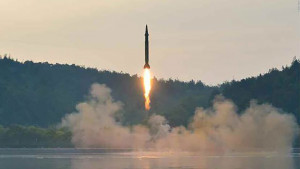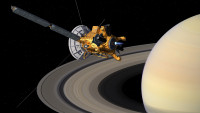


In breaking news, North Korea has launched another missile, less than two weeks after its possible hydrogen bomb test. South Korean military officials has reportedly said that the missile was fired from an airfield close by Pyongyang and headed eastward. Military officials also state that said missile likely reached an altitude of 770 kilometers and flew for 3,700 kilometers. Emergency alerts in Japan went off around 7:06 am Thursday morning, with officials saying the missile fell into the Pacific Ocean about 2,000 kilometers east of Hokkaido. A North Korean state agency has already threatened to use nuclear weapons to 'sink' Japan and reduce the United States to quote, "ashes and darkness" for supporting the latest sanctions from the UN Security Council. The Korea Asia-Pacific Peace Committee which is North Korea's official propaganda program also said quote, "The four islands of the archipelago should be sunken into the sea by the nuclear bomb. Japan is no longer needed to exist near us," end quote.
Around 7:55 am Eastern Daylight Time tomorrow on Friday, September 15th, NASA will watch its 20-year-old, 4 billion dollar-plus spacecraft plunge into Saturn. The fuel is nearly depleted and the mission for Cassini has already stretched much further than originally planned. Keeping it going also has risks for some of Saturn's moons. The microbes from the probe could prove dangerous for the small ecosystems of moons like Enceladus and Titan. So the spacecraft will end its life by plunging itself into the atmosphere of Saturn. Before the last few weeks, Cassini has already made so many important discoveries. It has learned about whole new moons, discovered lakes of methan on Titan, jets of water on Enceladus and has made detailed observations on the planet's rings. On September 11th, a Monday, Cassini made a final pass-by around Titan which put the spacecraft on a final course aimed straight at the planet. Earl Maize, who is the project manager for the mission called this pass " a kiss goodbye." There is no way for this craft to turn away from the planet now. Many of the mission's scientist recall their journey through studying Saturn with Cassini. Their families have gotten to know each other, children have grown up together, and now they are sharing the end of the incredible mssion. Cassini will have one last assignment before its destruction as it breaches the atmosphere. It will look at the composition of Saturn's atmosphere and send its findings to NASA before breaking apart and melting.
The National Weather Service is predicting nearly a half-inch of rainfall in Portland throughout the next week. Wet weather will likely arrive late Sunday and we can expect widespread showers on Monday and Tuesday. This will be the first serious rainfall in the city after nearly three months of dry season. The precipitation will be a welcome sight as more than 20 wildfires are burning throughout the state, including the Eagle Creek fire in the Columbia River Gorge and the 185,000 acre Chetco Bar Fire in southern Oregon.
- KBOO

